Unit 1 Friendship grammar direct speech &indirect speech
文档属性
| 名称 | Unit 1 Friendship grammar direct speech &indirect speech |
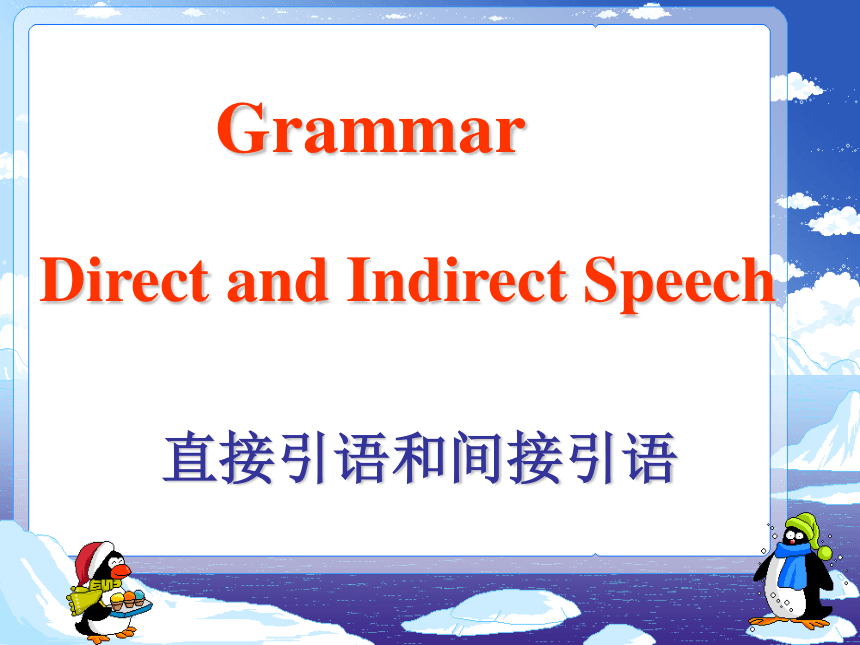
|
|
| 格式 | rar | ||
| 文件大小 | 1.1MB | ||
| 资源类型 | 教案 | ||
| 版本资源 | 人教版(新课程标准) | ||
| 科目 | 英语 | ||
| 更新时间 | 2010-09-13 00:00:00 | ||
图片预览

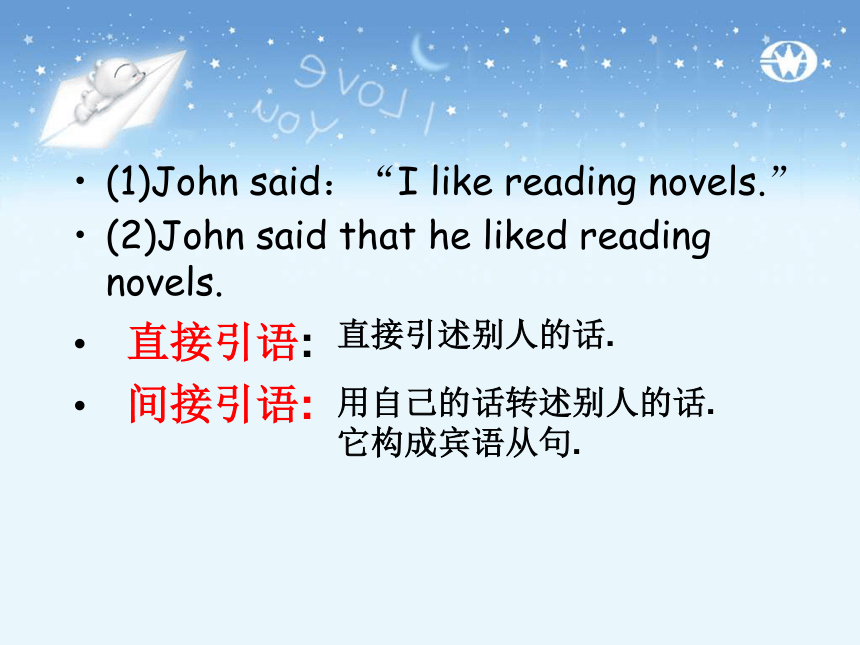
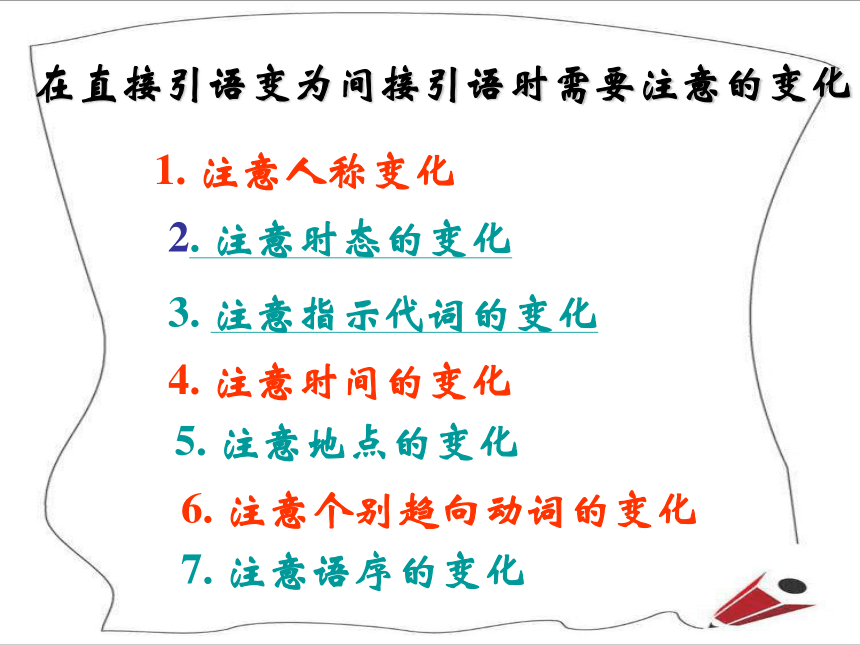
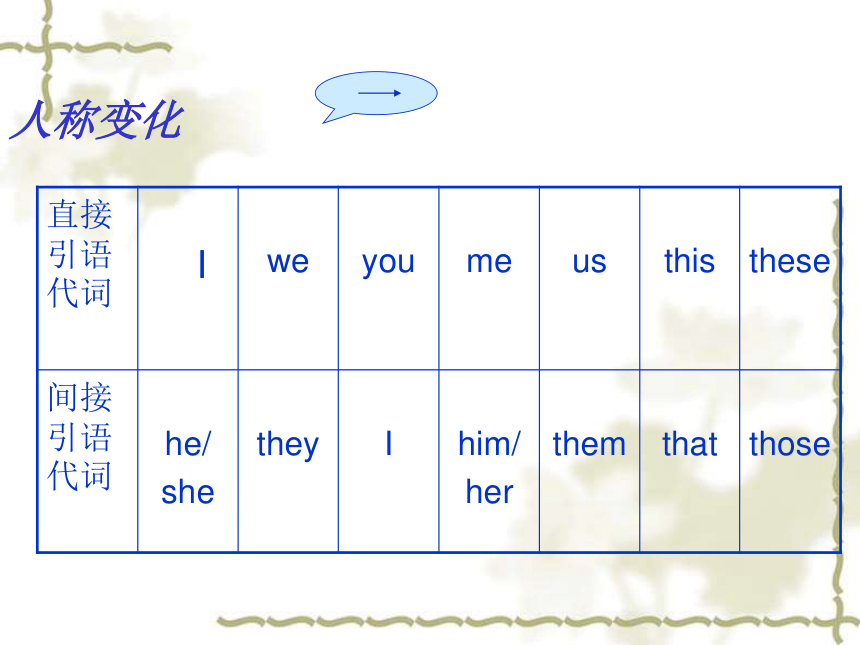
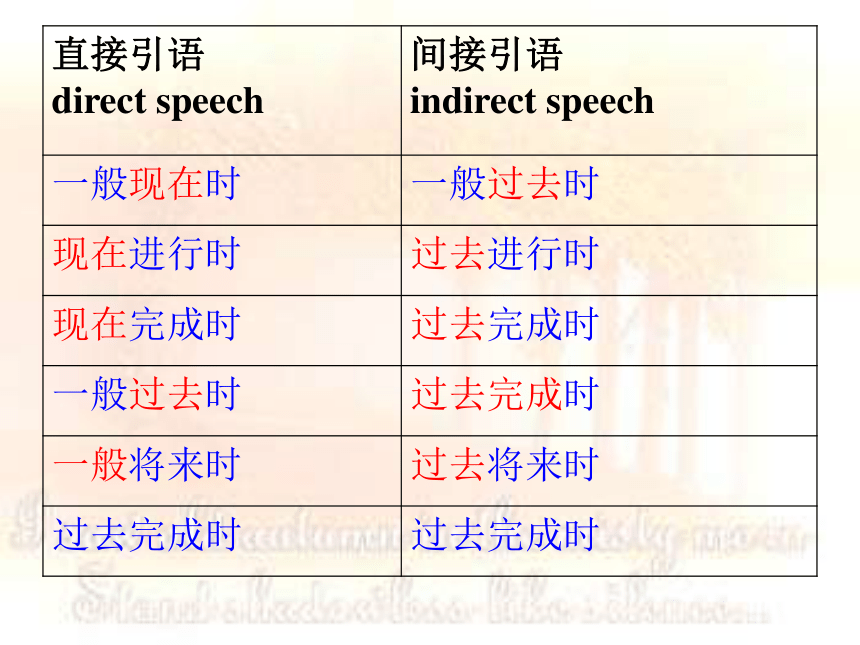
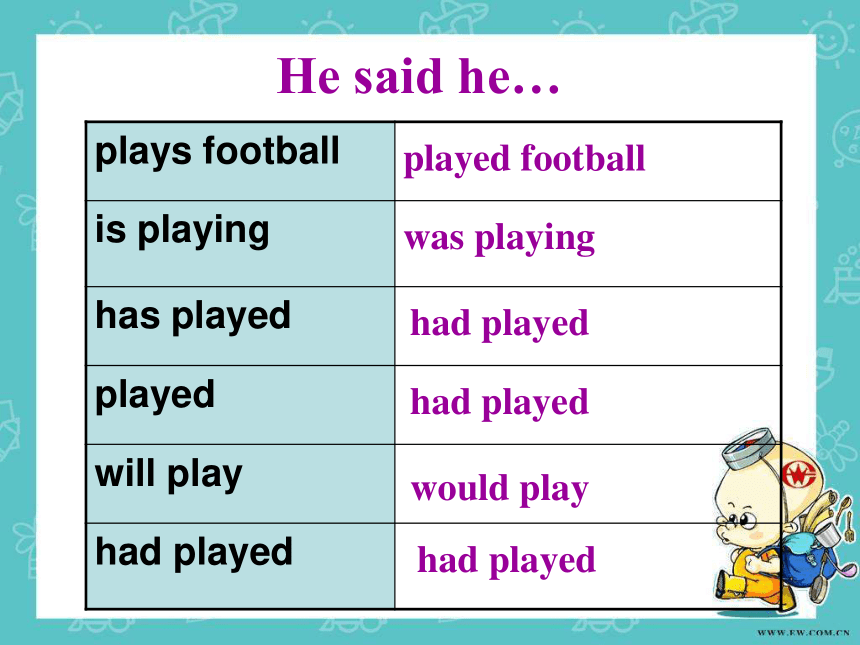
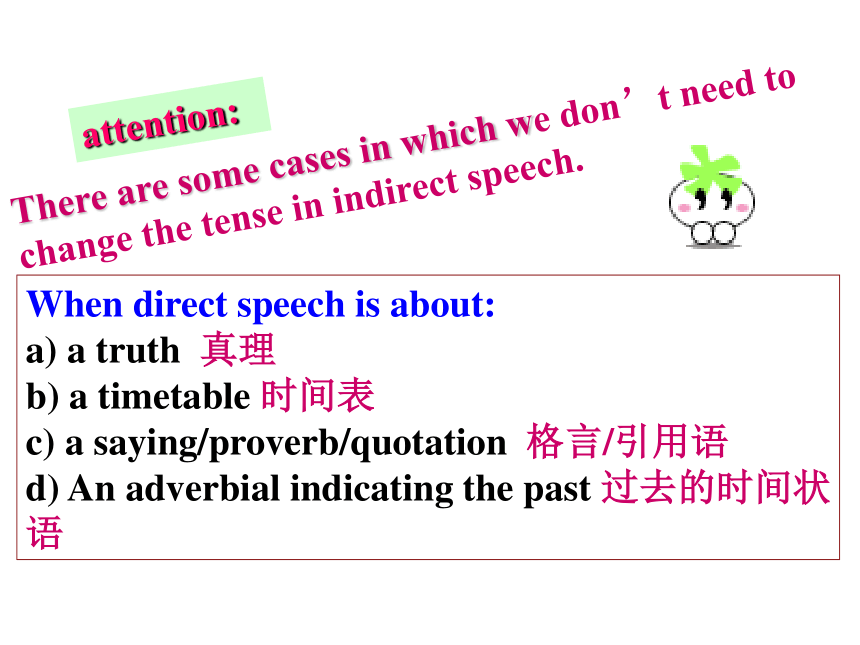
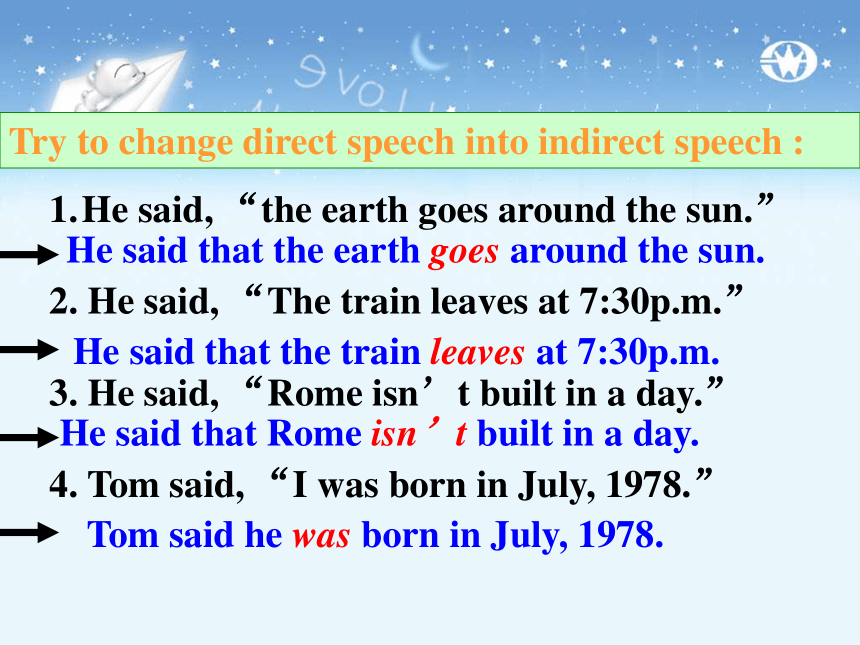
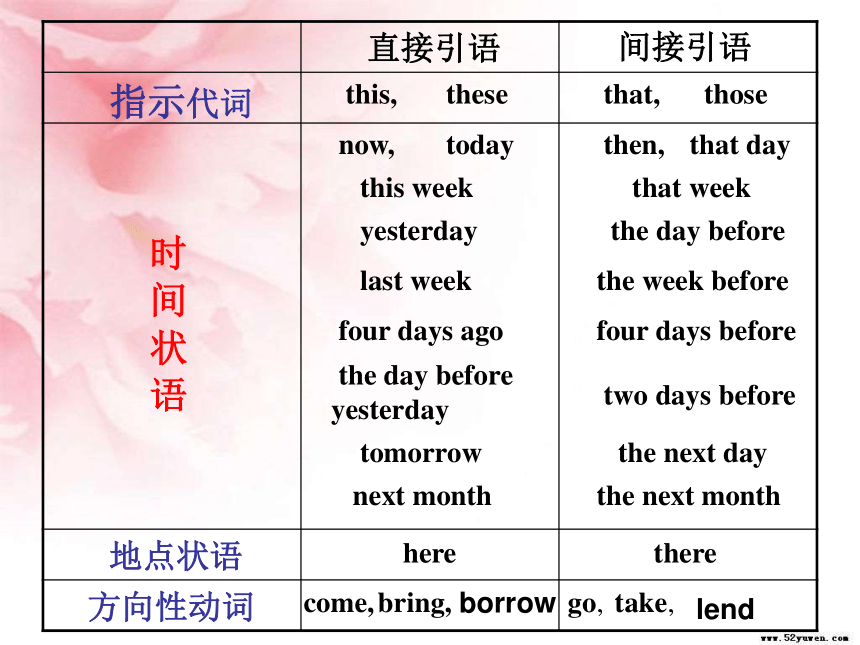
文档简介
课件28张PPT。Grammar直接引语和间接引语Direct and Indirect Speech
(1)John said:“I like reading novels.”
(2)John said that he liked reading novels.
直接引语:
间接引语:直接引述别人的话.用自己的话转述别人的话.
它构成宾语从句.在直接引语变为间接引语时需要注意的变化2. 注意时态的变化1. 注意人称变化7. 注意语序的变化3. 注意指示代词的变化4. 注意时间的变化5. 注意地点的变化6. 注意个别趋向动词的变化人称变化He said he…played footballwas playinghad playedhad playedwould playhad playedattention:There are some cases in which we don’t need to change the tense in indirect speech.When direct speech is about:
a) a truth 真理
b) a timetable 时间表
c) a saying/proverb/quotation 格言/引用语
d) An adverbial indicating the past 过去的时间状语Try to change direct speech into indirect speech :He said that the earth goes around the sun.He said that the train leaves at 7:30p.m.He said that Rome isn’t built in a day.Tom said he was born in July, 1978. 直接引语 间接引语
指示代词 时 间 状 语 地点状语 方向性动词 this, that, these those
now, then, today that day
this week that week yesterday the day before
last week the week before
four days ago four days before the day before yesterday two days before
tomorrow the next day
next month the next month
here there
come, go,bring, take, borrowlendGrammar: Direct and Indirect Speech (1)转述他人的陈述→陈述句→ She asked me what I was doing.1) He said , “I’m going to Beijing.”→ He said that he was going to Beijing.2) He asked, “Are you a teacher?”→ He asked me if /whether I was a teacher.3) She said , “What are you doing?”2. 转述他人的疑问→一般疑问句3. 转述他人的问题→特殊疑问句 直接引语变成间接引语,句子结构的变化
He said, “I have been to the Great Wall. ”
He said to us that he had been to the Great Wall.
He said, “I'll give you an examination next Monday. ”
He told us that he would give us an examination the next Monday.
1.陈述句
用连词that引导,that在口语中常省略。主句的谓语
动词可直接用引语中的said, 也可用told来代替,注意,
可以说said that, said to sb. that, told sb. that,
不可直接说told that
2.一般疑问句 He said, “Do you have any difficulty with pronunciation?”
He asked (me) whether/if I had any difficulty with my pronunciation.
He said, “You are interested in English, aren't you?”
He asked whether I was interested in English. 间接引语用连词whether或if引导,原主句中谓语动词said要改为asked(me/him/us等),语序是陈述句的语序
3.特殊疑问句 He said to me,“What's your name?”
He asked me what my name was.
He asked us, “How many car factories have been built in your country?”
He asked us how many car factories had been built in our country. 原来的疑问词作为间接引语的连词,主句的谓语动词用ask(sb. )来表达,语序改为陈述句语序
“What’s the matter with you?"said the docotor. The docotor asked what’s the matter with me. 4.选择疑问句 He asked, “Do you speak English or French?”
He asked me whether I spoke English or French. 用whether…or…表达,而不用if…or…,也不用either…or…
"Come in and sit down please!"she said to us.She told/asked us to go in and sit down. 祈使句变为间接引语时,将祈使句的谓语动词变成不定式。5.祈使句"Tom,"he said to him,"come here,please."He asked Tom to go there.Michael Phelps“I have a long body and long arms, a gift and love for swimming.”Phelps said he had a long body and long arms, and a gift and love for swimming.“I started swimming at an young age in order to treat my ADHD disease.” Phelps said he had started swimming at an young age in order to treat his ADHD disease.“I receive a 5-hour training every
day.”Phelps said he received a 5-hour training every day.“I always desire to be the winner, to win gold medals and to break world records.”Phelps said he always desired to be the winner, to win gold medals and to break world records.“One of my favorite things is to compete with the best swimmers in the world.”Phelps said one of his favorite things was to compete with the best swimmers in the world.“I have many goals, and all of them are high.” Phelps said he had many goals, and all of them were high.“I will always try my best to be Phelps No.1.”Phelps said he would always try his best to be Phelps No.1.Secrets of Phelps’ success? gift
interest
determination
courage
hard work
ambition
……Exercises:1. He said , “I m afraid I can’t finish this work.”2.He said , “I haven’t heard from him since May.”
3.Tom said “I will see you next week.”
He said that he was afraid he couldn’t finish that work.He said that he hadn’t heard from him since May.Tom said that he would see me the next week.
4. “Why were you late again?” The teacher said to me.
5. “Have you been to Paris?” My classmate asked me.
6. His friends asked him if he would go to Dalian.
The teacher asked me why I was late again.His friends asked him, “Will you go to Dalian?”My classmate asked me if I had been to Paris.Goodbye!
(1)John said:“I like reading novels.”
(2)John said that he liked reading novels.
直接引语:
间接引语:直接引述别人的话.用自己的话转述别人的话.
它构成宾语从句.在直接引语变为间接引语时需要注意的变化2. 注意时态的变化1. 注意人称变化7. 注意语序的变化3. 注意指示代词的变化4. 注意时间的变化5. 注意地点的变化6. 注意个别趋向动词的变化人称变化He said he…played footballwas playinghad playedhad playedwould playhad playedattention:There are some cases in which we don’t need to change the tense in indirect speech.When direct speech is about:
a) a truth 真理
b) a timetable 时间表
c) a saying/proverb/quotation 格言/引用语
d) An adverbial indicating the past 过去的时间状语Try to change direct speech into indirect speech :He said that the earth goes around the sun.He said that the train leaves at 7:30p.m.He said that Rome isn’t built in a day.Tom said he was born in July, 1978. 直接引语 间接引语
指示代词 时 间 状 语 地点状语 方向性动词 this, that, these those
now, then, today that day
this week that week yesterday the day before
last week the week before
four days ago four days before the day before yesterday two days before
tomorrow the next day
next month the next month
here there
come, go,bring, take, borrowlendGrammar: Direct and Indirect Speech (1)转述他人的陈述→陈述句→ She asked me what I was doing.1) He said , “I’m going to Beijing.”→ He said that he was going to Beijing.2) He asked, “Are you a teacher?”→ He asked me if /whether I was a teacher.3) She said , “What are you doing?”2. 转述他人的疑问→一般疑问句3. 转述他人的问题→特殊疑问句 直接引语变成间接引语,句子结构的变化
He said, “I have been to the Great Wall. ”
He said to us that he had been to the Great Wall.
He said, “I'll give you an examination next Monday. ”
He told us that he would give us an examination the next Monday.
1.陈述句
用连词that引导,that在口语中常省略。主句的谓语
动词可直接用引语中的said, 也可用told来代替,注意,
可以说said that, said to sb. that, told sb. that,
不可直接说told that
2.一般疑问句 He said, “Do you have any difficulty with pronunciation?”
He asked (me) whether/if I had any difficulty with my pronunciation.
He said, “You are interested in English, aren't you?”
He asked whether I was interested in English. 间接引语用连词whether或if引导,原主句中谓语动词said要改为asked(me/him/us等),语序是陈述句的语序
3.特殊疑问句 He said to me,“What's your name?”
He asked me what my name was.
He asked us, “How many car factories have been built in your country?”
He asked us how many car factories had been built in our country. 原来的疑问词作为间接引语的连词,主句的谓语动词用ask(sb. )来表达,语序改为陈述句语序
“What’s the matter with you?"said the docotor. The docotor asked what’s the matter with me. 4.选择疑问句 He asked, “Do you speak English or French?”
He asked me whether I spoke English or French. 用whether…or…表达,而不用if…or…,也不用either…or…
"Come in and sit down please!"she said to us.She told/asked us to go in and sit down. 祈使句变为间接引语时,将祈使句的谓语动词变成不定式。5.祈使句"Tom,"he said to him,"come here,please."He asked Tom to go there.Michael Phelps“I have a long body and long arms, a gift and love for swimming.”Phelps said he had a long body and long arms, and a gift and love for swimming.“I started swimming at an young age in order to treat my ADHD disease.” Phelps said he had started swimming at an young age in order to treat his ADHD disease.“I receive a 5-hour training every
day.”Phelps said he received a 5-hour training every day.“I always desire to be the winner, to win gold medals and to break world records.”Phelps said he always desired to be the winner, to win gold medals and to break world records.“One of my favorite things is to compete with the best swimmers in the world.”Phelps said one of his favorite things was to compete with the best swimmers in the world.“I have many goals, and all of them are high.” Phelps said he had many goals, and all of them were high.“I will always try my best to be Phelps No.1.”Phelps said he would always try his best to be Phelps No.1.Secrets of Phelps’ success? gift
interest
determination
courage
hard work
ambition
……Exercises:1. He said , “I m afraid I can’t finish this work.”2.He said , “I haven’t heard from him since May.”
3.Tom said “I will see you next week.”
He said that he was afraid he couldn’t finish that work.He said that he hadn’t heard from him since May.Tom said that he would see me the next week.
4. “Why were you late again?” The teacher said to me.
5. “Have you been to Paris?” My classmate asked me.
6. His friends asked him if he would go to Dalian.
The teacher asked me why I was late again.His friends asked him, “Will you go to Dalian?”My classmate asked me if I had been to Paris.Goodbye!
